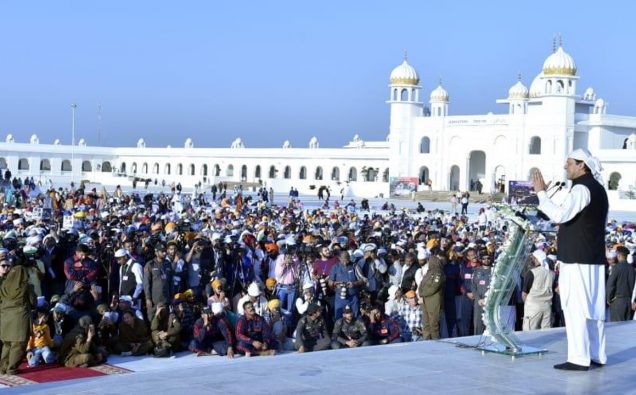
Pakistan’s Prime Minister Imran Khan inaugurated the Kartarpur Corridor on Saturday, for Indian Sikhs, allowing them to visit the Guru Nanak’s final resting place Gurdwara Darbar Sahib.
The corridor running four kilometer provides visa-free access to Sikh pilgrims from across the border in India to travel to Gurudwara Darbar Sahib in Kartarpur, where Guru Nanak, the founder of Sikhism, spent the final 18 years of his life.
The passage links the town of Kartarpur in Narowal district of Pakistani Punjab to Dera Baba Nanak in Gurdaspur in Indian Punjab.
Speaking at the inaugural ceremony, Prime Minister Imran Khan said he was extremely happy for the global Sikh community.
“All religions teach us two things: justice and love,” said the premier.
“A leader will always bring people together and will not divide them. A leader does not spread hatred and canvasses votes on the basis religion,” said the prime minister said in a not-too-veiled dig at Indian Prime Minister Narendra Modi, whose anti-Pakistan and revocation of Kashmir’s autonomy have pushed the region to a standoff.
On the long-standing Kashmir dispute, the prime minister said he had suggested to Modi to resolve the issue.
“What we are witnessing in Kashmir today, it is not an international issue anymore. It has escalated to a humanitarian crisis.”
“Unfortunately things have gotten even worse for the people of Kashmir.”
He further said that South Asia could only make progress when the issue of Kashmir is resolved. “And, God willing, that day is not far.”
The prime minister, who arrived earlier using the shuttle service being used by the Sikh pilgrims, greeted the Indian delegation shortly after his arrival.
Cricketer-turned-politician Navjot Singh Sidhu lauded PM Imran’s Kartarpur initiative and paid rich tribute to the premier.
“This is the first prime minister, a lion, who did not care about benefit or loss and made the Kartapur dream a reality for millions of Sikhs around the world.”
“My friend Imran turned our dream into reality in just 10 months.”
Former Indian prime minister Manmohan Singh led a delegation of Sikh pilgrims as they crossed the international border. He was also accompanied by Indian Punjab’s Chief Minister Amarinder Singh.
“I hope India and Pakistan relations improve as a result of this beginning,” Manmohan Singh said while talking to Pakistan Television.
On other side of the border, Indian Prime Minister Narendra Modi while seeing off the Sikh Jatha for Pakistan, thanked the prime minister Imran Khan and said: “I also thank Pakistan’s Prime Minister Imran Khan for understanding India’s wishes and turning Kartarpur into reality”.
The right-wing leader added that the opening of the historic corridor has “brought us immense happiness”.
“I congratulate all of my Sikh brothers and sisters in India and around the world on the inauguration of Karatarpur corridor.”
But the inauguration of the corridor coincided with a disturbing development in India where the Supreme Court ruled in favor of RSS-motivated ideologues that allows the Hindus to build a temple in place of the historical Babri Mosque, demolished in 1992, and requires that Muslims be given a separate place to build a mosque. Modi is a lifelong member of the RSS and his BJP ruling party draws its inspiration from the RSS Hindutva ideology.

The first batch of Sikh pilgrims arrived at Gurdwara Darbar Sahib after undergoing the immigration process at the border terminal earlier today.
As a gesture of goodwill, PM Imran had also waived the passport requirement for Sikh pilgrims entering the country on this auspicious occasion.
Nearly 10,000 pilgrims are set to perform their rituals within the compound of the Gurdwara. The Gurdwara has been in Pakistan for seven decades since Indian gained independence from Britain and Pakistan emerged as a new South Asian country in 1947.
Earlier, Sikh pilgrims had to travel by road to Lahore and then to Narowal to perform their rituals at the Gurudwara Darbar Sahib.
The project was initiated on the directives of the premier as a testimony of Pakistan’s commitment to promoting interfaith harmony and regional peace.

















